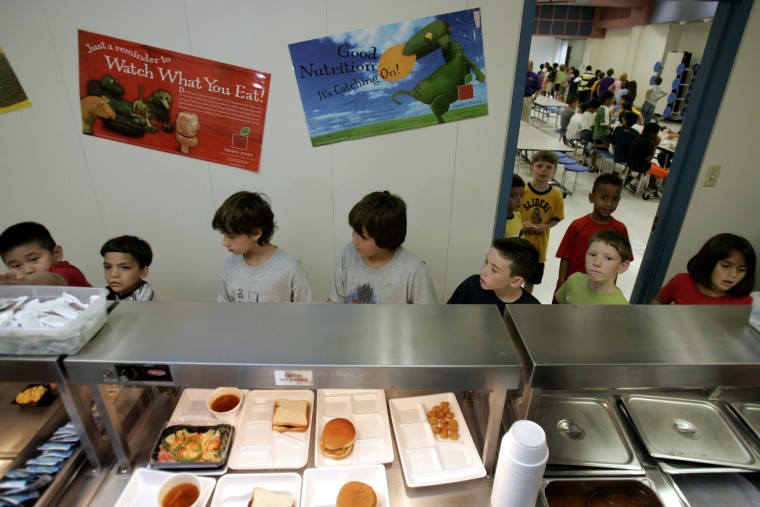Rep. Jack Kingston, currently running for the U.S. Senate in his home state of Georgia, recently got into a little trouble with his far-right allies: The Republican congressman conceded that he'd like to work on improving the Affordable Care Act. "A lot of conservatives say, 'Nah, let's just step back and let this thing fall to pieces on its own.' But I don't think that's always the responsible thing to do," Kingston said.
The right, predictably, was outraged by this mild break with GOP orthodoxy. But don't worry, Kingston knows how to get back in conservatives' good graces: he's recommending making it harder for poor children to get food. Amanda Terkel had this remarkable report yesterday:
Rep. Jack Kingston (R-Ga.) wants kids to learn early in life that there's no such thing as a free lunch. To make sure they absorb that lesson, he's proposing that low-income children do some manual labor in exchange for their subsidized meals. On Saturday, Kingston, who is vying to be his party's Senate nominee next year, spoke at a meeting of the Jackson County Republican Party. He ... came out against free lunches, saying that children should have to pay at least a nominal amount or do some work like sweeping cafeteria floors.
"But one of the things I've talked to the secretary of agriculture about: Why don't you have the kids pay a dime, pay a nickel to instill in them that there is, in fact, no such thing as a free lunch?" the congressman said. "Or maybe sweep the floor of the cafeteria -- and yes, I understand that that would be an administrative problem, and I understand that it would probably lose you money. But think what we would gain as a society in getting people -- getting the myth out of their head that there is such a thing as a free lunch."
Remember, the phrase "free lunch" is usually metaphorical. Kingston, however, means it quite literally -- he doesn't think low-income children should be eligible for food unless they pay or work for it.
Terkel added, "Kingston's plan could create significant embarrassment for low-income children, who would be sweeping cafeteria floors while their wealthier peers did normal kid activities. And while the low-income children would supposedly be learning the lesson of hard work, their wealthier peers would simply be getting a free lunch from their parents."
If this sounds vaguely familiar, there's a good reason. As long-time readers may recall, Newt Gingrich, during his failed presidential campaign, said school districts should fire "unionized janitors," and instead pay children as young as nine years old to maintain their own schools.
Gingrich argued at the time that poor children are probably criminals. "They have no habit of 'I do this and you give me cash' ... unless it's illegal," he said.
Two years later, we see another Georgian Republican dreaming of the day in which kids tackle janitorial tasks, only in Kingston's vision, the poor children would be working in exchange for food.
Let's also not lose sight of the larger context here. Many congressional Republicans are pushing an agenda that goes out of its way to punish the poor: blocking unemployment benefits, cutting food stamps, rejecting a minimum-wage increase, and wherever possible, saying no to Medicaid expansion.
In terms of punitive measures towards the poor, it's tough to make this platform even more offensive. Jack Kingston has managed to find a way.
